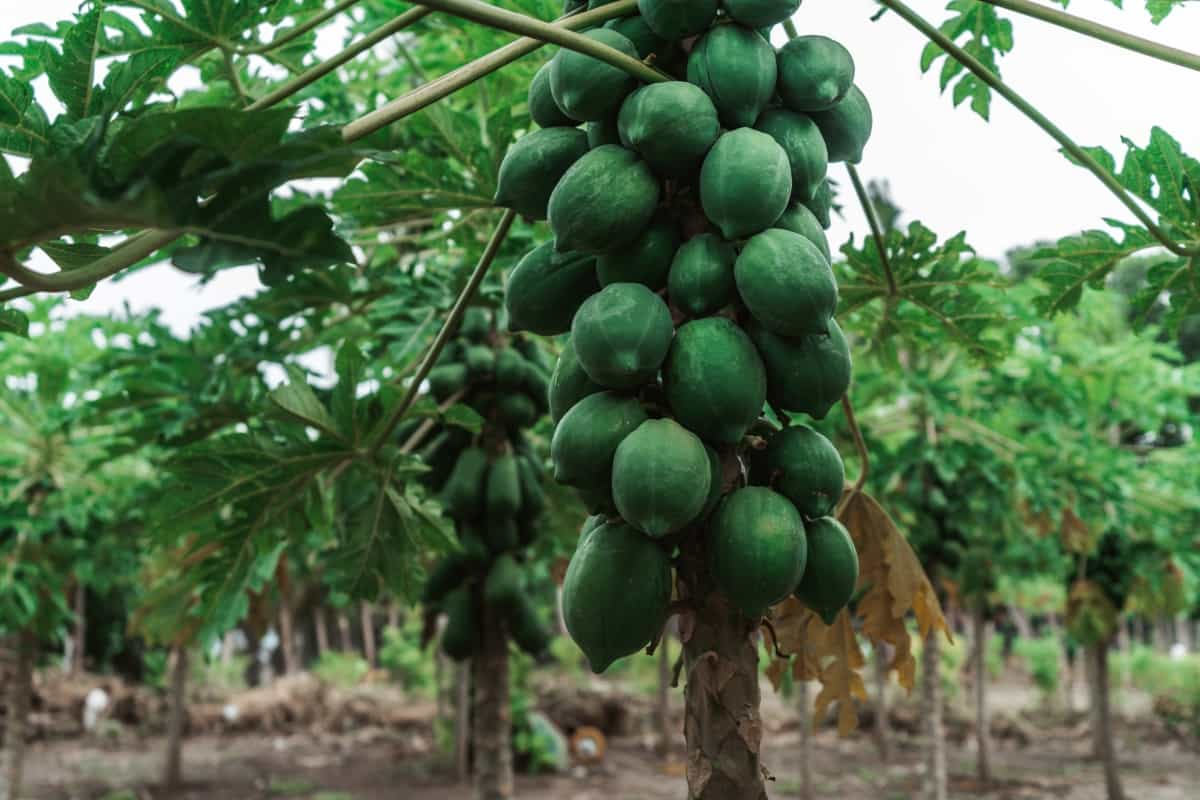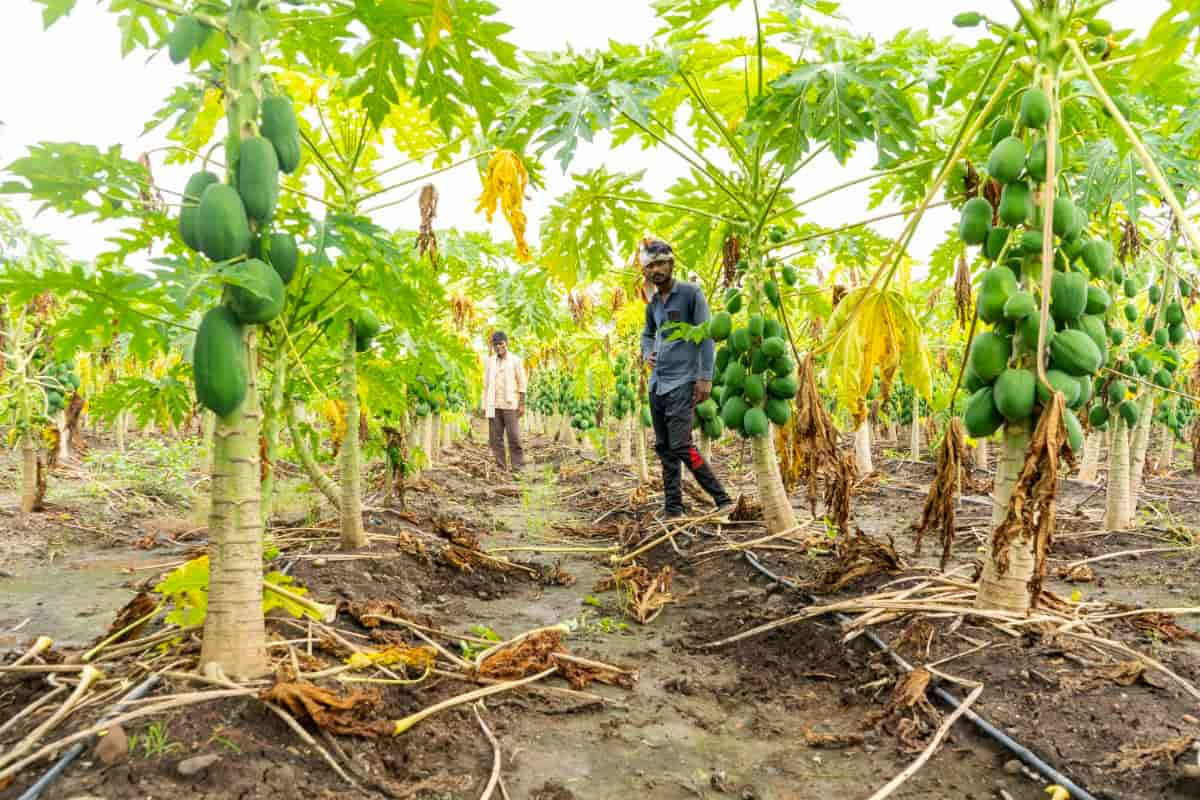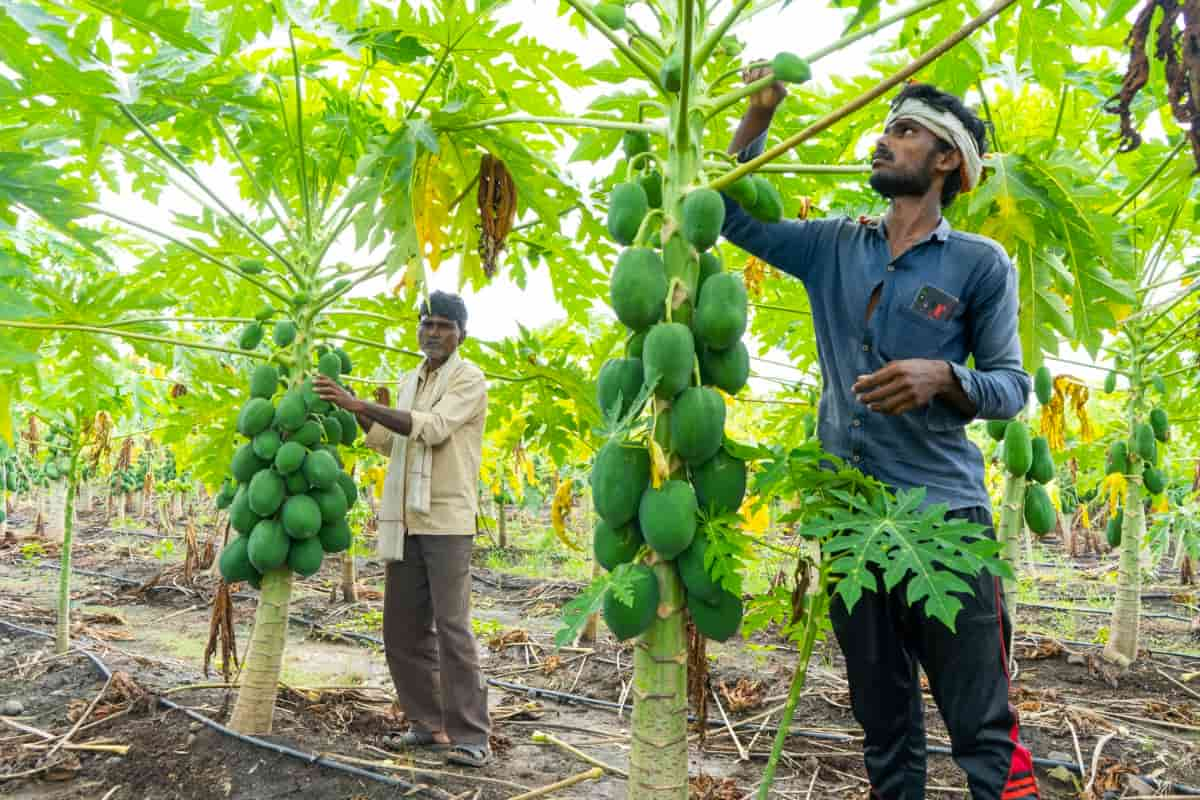The papaya fruit is widely recognized as a highly nutritious tropical fruit offering diverse health advantages. It is a prominent ingredient in numerous international culinary traditions and is considered a fundamental dietary component. One significant reason for its popularity is its versatility – it can be consumed raw, ripe, or used in various dishes.

As the demand for papaya rises locally and internationally, there is increased interest in papaya contract farming. In essence, contract farming is an agreement between farmers and processing or marketing firms to produce and supply agricultural products under forward agreements. Papaya contract farming can potentially be profitable for farmers, especially considering the profit per acre.
Papaya Contract Farming
The Fundamentals of Papaya Contract Farming
Contract farming involves the farming and marketing papaya under a contract agreement between a grower and a buyer. The agreement outlines specific terms, including price, quality, quantity, and time. Under this system, farmers agree to produce a particular variety of papaya for the buyer, typically a processing or marketing firm. In contrast, the buyer agrees to buy the product at a pre-determined price. The agreement may also specify farming practices, yield per acre, and other factors pertinent to the production process.
This type of farming allows for mutual benefit where farmers receive a ready market and potentially high profit per acre, and buyers receive a steady supply of quality produce. One of the keys to making papaya contract farming a profitable venture is to thoroughly understand the cost of production and expected yield. Yield pertains to the quantity of papaya that can be harvested per acre. Typically, a properly managed papaya farm can produce an annual yield ranging from 25 to 40 tons per acre.
The fluctuation of yield depends on variables such as papaya variety, soil quality, and farming techniques. Yield plays a critical role as it directly affects the profitability per acre. The cost of papaya farming consists of several components, including land preparation, seedlings, fertilizers, labor, irrigation, pest and disease control, and post-harvest handling. Factors such as transportation and marketing may also add to the overall cost. The production cost is important as it is subtracted from the gross income to determine the net profit.
Profitability of Papaya Contract Farming
The profitability of papaya contract farming is determined by factors such as yield, market price, and cost of production. When it comes to the profit per acre, the math is simple: the greater the yield and market price, and the lower the cost of production, the higher the profit. Given the current market trends, the demand for papaya, and the average yield, the profit per acre can be quite significant.
For example, let’s consider a hypothetical situation. Assuming the cost of production is around $2000 per acre and the yield is 30 tons per acre. If the contracted price is $100 per ton, the gross income would be $3000 per acre. Subtracting the cost of production from the gross income, the profit per acre is approximately $1000. Of course, these figures can fluctuate based on various factors, including changes in market prices, yield, and production costs.
Challenges and Solutions in Papaya Contract Farming
Despite its potential profitability, papaya contract farming is not without challenges. One key challenge is the fluctuation in market prices. While contracts typically specify a fixed price, unexpected market changes can affect profitability. To mitigate this risk, contracts could include provisions for price adjustments based on prevailing market conditions.
In case you missed it: Blooming Harvest: Contract Farming for Greenhouse Vegetables and Flowers

Another challenge is the risk of crop failure due to pests, diseases, or adverse weather conditions. This risk can be mitigated through good agricultural practices, such as proper land preparation, regular monitoring for pests and diseases, appropriate use of fertilizers, and irrigation. In some cases, farmers may also opt to purchase crop insurance as risk management.
Yet another challenge is the high initial cost of establishing a papaya farm, which can deter potential farmers. However, this can be offset by the high yield and profit per acre that a well-managed papaya farm can provide over time. Furthermore, some contract farming arrangements may provide farmers with financial support or resources, helping lower the initial setup cost.
The Future of Papaya Contract Farming
The future of papaya contract farming looks promising due to the increasing global demand for this versatile fruit. The high yield and profit per acre make it an attractive proposition for farmers and investors alike. Furthermore, advancements in farming technology and practices will likely increase efficiency and productivity, leading to higher yields and lower costs.
For instance, precision farming technology can help farmers make more informed decisions regarding irrigation, fertilization, and pest control, resulting in higher yields and reduced costs. Also, developing disease-resistant papaya varieties can further boost yield and profitability. Regarding market trends, the growing awareness of the health benefits of papaya and its increasing use in various food products, pharmaceuticals, and cosmetics, is likely to drive demand and market prices.
Building Sustainable Relationships in Papaya Contract Farming
Another critical aspect of successful papaya contract farming is establishing sustainable relationships between farmers and buyers. This relationship should not only be limited to contractual terms but should extend to knowledge sharing, capacity building, and financial support. Regular communication, prompt resolution of conflicts, and cooperative problem-solving mechanisms can ensure the longevity and profitability of the agreement.
In case you missed it: Cultivating Green Gold: Exploring the Potential of Spirulina Contract Farming

Additionally, buyers could aid in providing farmers with resources, agricultural training, or technical assistance, thus ensuring that the farming practices meet the set standards and contribute to the overall increase in yield and profit per acre. This relationship benefits both parties: farmers receive the necessary support to increase productivity, while buyers are assured of a stable, high-quality supply of papaya.
Conclusion
To sum up, papaya contract farming can be profitable for farmers due to the high profit per acre and growing market demand. While there are challenges involved, including fluctuations in market prices, risk of crop failure, and high initial setup costs, these can be mitigated through proper planning, good farming practices, risk management strategies, and favorable contract terms. Additionally, advancements in farming technology and the development of disease-resistant papaya varieties offer opportunities for increased yield and profitability.
- Ultimate Guide to Ossabaw Island Hog: Breeding, Raising, Diet, and Care
- Ultimate Guide to Juliana Pig: Raising Facts, Size, Diet, Care, and Lifespan
- Raising Lleyn Sheep: Disadvantages, Price, Uses, Characteristics, and Care
- Ultimate Guide to Meishan Pig: Breed Facts, Breeding, Raising, and Care
- Ultimate Guide to Teacup Pigs: Raising, Diet, Lifespan, Cost, and Care
- Guide to Raising Poll Dorset Sheep: Facts, Profile, Characteristics, Uses, and Care
- Ultimate Guide to Bighorn Sheep: Characteristics, Diet, Lifespan, Breeding, and Lifecycle
- Ultimate Guide to Raising Katahdin Sheep: Farming Facts, Breed Profile, Uses, and Care
- Ultimate Guide to Raising Oreo Cows: Belted Galloways Farming Facts, Profile, Uses, and Care